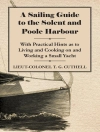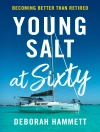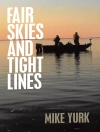This edition is Part II of The Island Hopping Digital Guide to the Exuma Cays and covers the Exuma Park.
The Island Hopping Digital Guides are the digital versions of the world-famous cruising guides written by Stephen J. Pavlidis. Over the past 20 years, Stephen J. Pavlidis has written more than 10 excellent cruising guides covering all of the waters from south Florida to the islands of Trinidad and Tobago and everything in between.
Each cruising guide contains many color charts, photos and loads of current local knowledge making this a must-have guide for yachts planning to cruise the Bahamas. With full-color aerial harbor photos and full-color sketch charts, it contains extremely accurate hydrographic data based on personally conducted independent surveys by the author. Each guide also includes extensive navigational instructions, GPS waypoints, approaches and routes, anchorages, services, dive sites, history, basic information for cruising in the Bahamas, extensive appendices, contact information and more.
These cruising guides are not only essential for navigation and piloting while cruising the Bahamas, but also for use at anchor or dockside because of the valuable shoreside information they contain. The digital versions also have the added convenience of live links for email and websites to the many services and marinas found throughout the region. In addition, they make excellent planning tools for future adventures.
Innehållsförteckning
Table of Contents
Introduction
The Basics
Anchoring
Clothing
Currency
Customs and Immigration
The Defence Force
Dinghy Safety
Diving
Eyeball Navigation
Fishing
Garbage
Ham Radio
Holidays
Hurricane Holes
Junkanoo
Mailboats
Medical Emergencies
Provisioning
Tides and Currents
VHF
Weather
Using the Charts
List of Charts
A History of The Exumas
The First Inhabitants
Privateers, Buccaneers, Pirates
The Loyalists
The American Civil War Years
The Birth of Tourism
Prohibition
The Tourism Boom
Drug Smuggling
The Exumas Today
Flora and Fauna
Fauna
Epifauna
Flora
Epiflora
Routes to the Exumas
Exuma Cays Land and Sea Park
Exuma Park
A Brief History
Boundaries of the Park
Exuma Park Guidelines
Approaches
The Northern Park
Little Wax Cay, Wax Cay Cut
Shroud Cay
Little Pigeon Cay
Elbow Cay
Hawksbill Cay
Little Hawksbill Cay
Little Cistern Cay
Cistern Cay
The Wide Opening
Warderick Wells
The North Mooring Field
The Park Headquarters
The Park Wardens
Moorings
Anchoring
Exploring Warderick Wells
The Emerald Rock Mooring Field
The South Mooring Field
The Lore of Warderick Wells
Pet Policy
Feeding the Wildlife
The Southern Park
Hall’s Pond Cay
White Bay Cay
Osprey Cay
Soldier Cay
Pasture Cay
O’Brien’s Cay
Bell Island
Cambridge Cay, Conch Cut
The Rocky Dundas
S.T.E.P.
Exuma Recipes
Conch Salad
Gin and Coconut Water
Peas and Rice
Scorched Conch
References
Appendices
Appendix A: Navigational Lights
Appendix B: Marinas
Appendix C: Service Facilities
Appendix D: Waypoints
Appendix E: Tidal Differences
Appendix F: Metric Conversion
Appendix G: Distances
About the Author
Om författaren
Stephen J. Pavlidis has been cruising the islands of The Bahamas and Caribbean aboard his 40′ cutter, IV Play, since 1989. In 1993, he met Ray Darville, then the Warden of the Exuma Cays Land and Sea Park, who drew Steve into a working relationship as a volunteer Deputy Warden. In this role Steve quickly gained an intimate knowledge of the waters of the Park and the Exuma Cays.
Realizing that the Exuma Cays Land and Sea Park deserved a bit more recognition than is given in even the best guides to the area, Steve and Ray produced A Cruising Guide to the Exuma Cays Land and Sea Park. The favorable response to that publication led to the publication of The Exuma Guide in 1995, covering the entire Exumas island chain in addition to the Park. The Exuma Guide, has been thoroughly updated for this new edition. Steve has resurveyed the region, updated all the information, and offers many new aerial photos and charts to assist you in navigation.
Steve’s books are different than most other cruising guides in some very significant ways. All of the charts in Steve’s books were created using data personally collected while visiting each area using a computerized system that interfaces GPS and depth soundings.
You can find out more about this exceptional author by visiting his Web site, www.Seaworthy.com where there is current news and information about Steve’s latest projects, as well as contact information.












